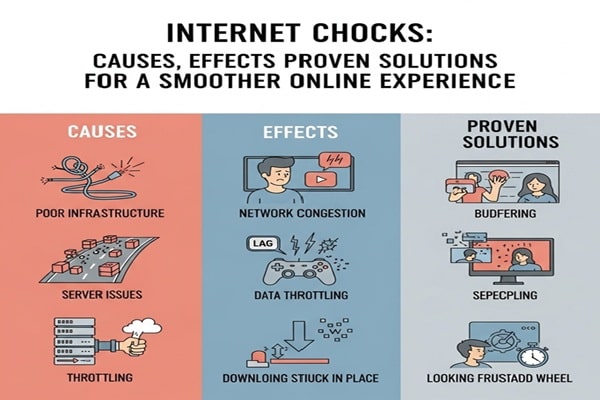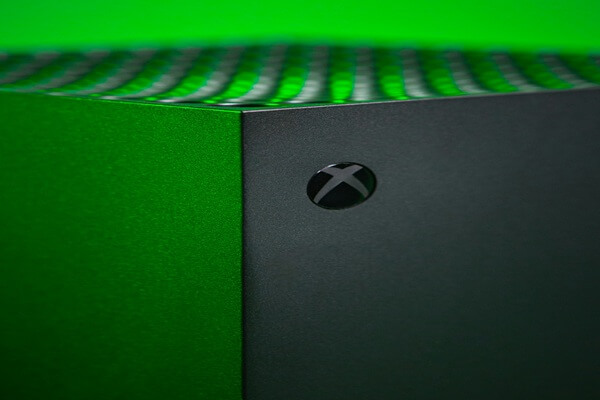Internet Chocks: Causes, Effects, and Proven Solutions for a Smoother Online Experience
Share your love

Ever found yourself stuck in the middle of a Zoom call or a Netflix binge only to be greeted by buffering, lag, or that annoying spinning wheel? If yes, you’re not alone—and what you’re likely experiencing is something called an internet chock. These sudden slowdowns or disruptions in your internet can turn everyday online tasks into frustrating chores.
Let’s break down exactly what internet chocks are, what causes them, how they affect your digital life, and most importantly—how to fix them.
What Are Internet Chocks, Really?
“Internet chock” might not be a term you hear every day, but chances are you’ve felt its effects. It refers to those irritating moments when your internet slows to a crawl or cuts out completely. Think laggy video calls, choppy gaming sessions, or payments failing mid-transaction. These chocks often strike without warning and can seriously disrupt your productivity—or your relaxation time.
Common Culprits Behind Internet Chocks
Before you can fix the problem, you’ve got to understand what’s causing it. Here are some of the most frequent triggers behind unstable internet connections:
1. Network Congestion
This one’s especially common during peak hours—think evenings or weekends. When too many devices in your home (or neighborhood) are online at the same time, your bandwidth gets stretched thin.
2. Weak Wi-Fi Signal
Thick walls, long distances, and interference from household items like microwaves can all weaken your Wi-Fi. The result? Dropped connections and slow speeds in certain parts of your home.
3. Outdated or Underpowered Equipment
Still using that router from 2015? It might not be up to the task. Older modems and routers often can’t handle the demands of modern internet usage, especially in households with multiple users.
4. ISP Throttling
Some internet service providers intentionally slow down traffic for certain types of online activities like streaming or gaming, especially when you’ve hit a data cap. This is known as throttling, and it can really mess with your speed.
5. Interference from Other Devices
Your baby monitor, cordless phone, or even the microwave can mess with your signal. These devices operate on similar frequencies as your router, leading to signal interference.
6. Software or Firmware Issues
Your router’s software, or firmware, might need an update. Bugs or outdated code can degrade performance and cause connection issues.
7. Weather and Environmental Conditions
Heavy rain, strong winds, or storms can damage infrastructure, especially if you’re using cable or satellite internet. This can lead to temporary or ongoing service problems.
How Internet Chocks Affect Your Online Life
When your internet connection hiccups, it can disrupt almost everything you do online. Here’s how:
Frustrating Streaming
Nothing ruins movie night faster than constant buffering. Low-quality video and random pauses can make streaming a nightmare.
Online Gaming Lag
Gamers know the pain of high ping. Choppy gameplay and lag can make competitive games almost unplayable—and definitely no fun.
Work-from-Home Interruptions
Video calls cutting out mid-meeting? File uploads stuck forever? Internet chocks can kill your productivity and cause you to miss key deadlines.
Failed Transactions
Trying to check out online or transfer money and your browser freezes? That’s not just annoying—it can cost you real money or cause major delays.
Poor VoIP and Video Calls
Apps like Zoom, Skype, and Google Meet require stable connections. Any chock can mean frozen screens, distorted audio, and dropped calls.
Also Read : Tecnoregio News: Your Premier Source for Technology and Innovation Updates
9 Practical Fixes to Prevent Internet Chocks
Now that we’ve covered the problems, let’s talk about the solutions. Here’s how you can improve your connection and avoid those irritating slowdowns:
1. Upgrade Your Internet Plan
If you’re streaming, gaming, working remotely, and have multiple users online, your current plan might not cut it. Look into a higher-speed plan with more bandwidth to meet your household’s needs.
2. Optimize Router Placement
Put your router in a central, elevated location away from walls and other electronics. Avoid tucking it in a cabinet or corner—it needs open space to spread that signal evenly.
3. Use a Wired Connection
Wi-Fi is convenient, but Ethernet cables offer more stable and faster speeds. For tasks that need reliability—like gaming or video calls—go wired.
4. Update Your Router’s Firmware
Check your router’s settings and make sure it’s running the latest firmware. Manufacturers regularly release updates to improve performance and fix bugs.
5. Limit Bandwidth-Hogging Apps
Close apps running in the background that you’re not using—especially those that auto-update or sync data. These can quietly eat up bandwidth without you noticing.
6. Upgrade Your Router
If your router is more than a few years old, it might be time for a replacement. Look for routers with the latest Wi-Fi standard (Wi-Fi 6 or higher) and dual-band or tri-band support.
7. Reduce Interference
Keep your router away from electronic devices that might interfere with its signal—things like cordless phones, baby monitors, or even smart fridges.
8. Try a Mesh Wi-Fi System
If you live in a large home or have multiple floors, a mesh system can spread your Wi-Fi signal evenly across the space—no more dead zones.
9. Contact Your ISP
Still struggling even after trying everything? Get in touch with your internet provider. There might be service issues in your area or better packages available.
FAQs: Quick Answers About Internet Chocks
What are internet chocks, and why do they happen?
Internet chocks are sudden disruptions or slowdowns in your internet connection. They can be caused by network congestion, interference, outdated hardware, or ISP limitations.
How do I know if internet chocks are my problem?
If your connection is mostly fine but suddenly slows down during peak hours or when many devices are online, chances are you’re dealing with a chock.
Can using a VPN help?
Sometimes. VPNs can help bypass ISP throttling, but they can also slightly slow your connection. If throttling is the issue, a VPN may help.
What kind of router should I buy to avoid chocks?
Look for a router that supports Wi-Fi 6 (802.11ax), has dual or tri-band capability, and offers features like QoS (Quality of Service) for traffic prioritization.
Do chocks affect mobile data too?
Yes. Mobile data can experience congestion, especially in crowded areas or during events. Try switching to Wi-Fi or using mobile data during off-peak times.
Final Thoughts: Stay Ahead of Slowdowns
In today’s fast-moving, always-connected world, internet chocks are more than just a minor annoyance—they can impact your productivity, entertainment, and peace of mind. But with a little knowledge and a few smart upgrades, you can take control of your connection.
![The Rising Popularity of the Swimsuit Edition [ABBB] – 1.20 21 Swimsuit Edition – Chapter](https://misstechy.com/wp-content/uploads/2025/09/w12-min.jpg)






